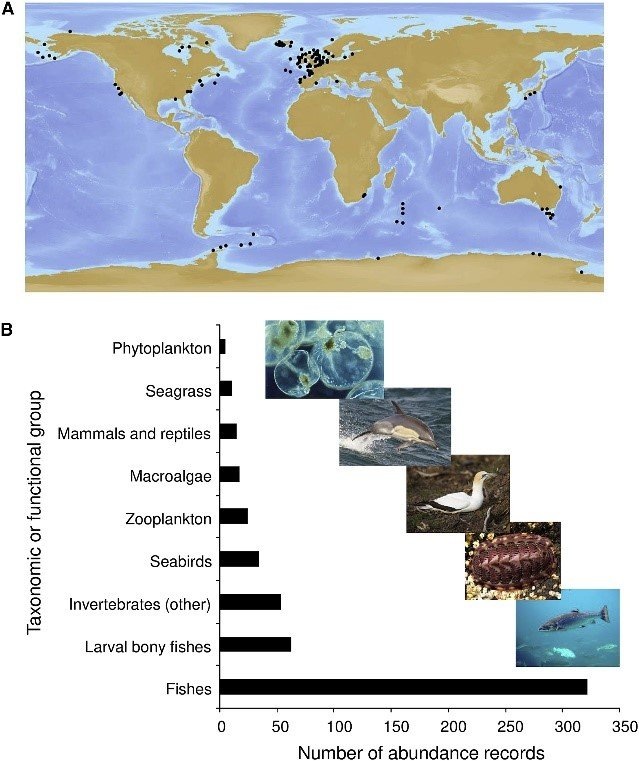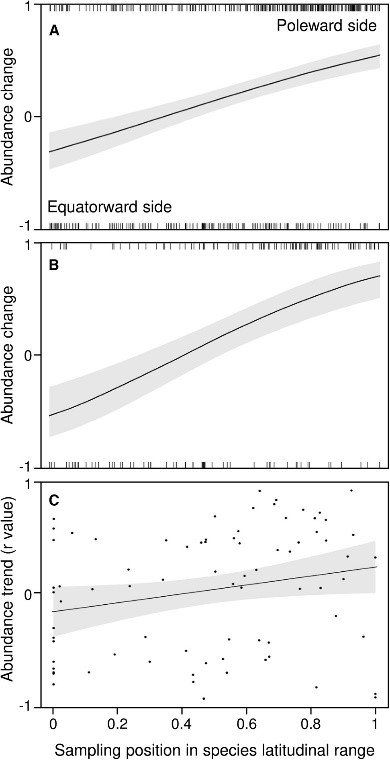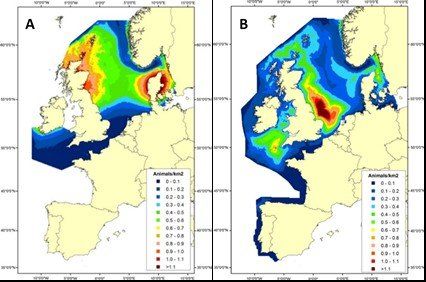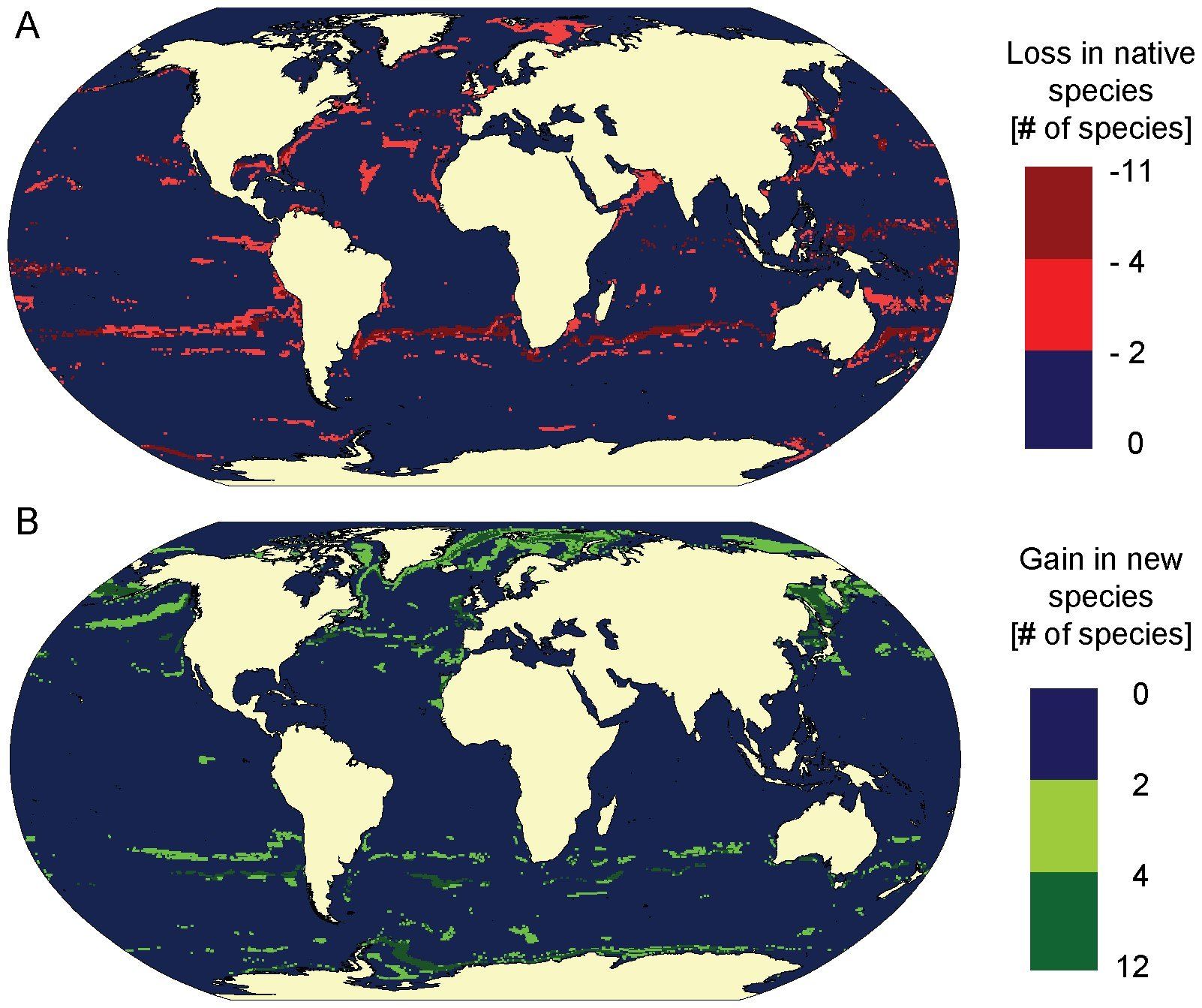Climate Change Driving Marine Species Towards Higher Latitudes.
Distribution trends in species have long been a hot-topic among ecologists. In recent decades mounting evidence points to a poleward re-distribution in terrestrial and marine species, at a rate per decade of 17km and 72km, respectively. A recent research paper has examined the impact of climate change over the last century on global trends in abundance and distribution of marine species. The results highlight a crucial global poleward shift in marine species and loss of species richness equatorward consistent with climate change, with dire implications for conservation efforts and policy-making.
Species distribution is determined by criteria such as its ability to disperse, as well as a balance between a fulfilment of its ecological and environmental requirements (Soberon, 2007). The ocean has been warming at an alarming rate since the industrial revolution. In response to this, marine species have needed to adapt to shifts in climate to stay within their thermal tolerance range. As such, an expected shift towards the poles and reduction at their equatorward edge range is anticipated.
In a new paper published in Cell Press, researchers analysed ocean-wide abundance and distribution trends in 304 marine species, across a range of taxonomical groups, from the smallest of primary producers up to marine megafauna. The research led by Dr. Hastings of Bristol University compiled and analysed 540 historical abundance trend data-sets across targeted species over the last century. Using this information, paired with linear models, they assessed and quantified how abundance change in species relates to the latitudinal sampled locations.
The results highlight a crucial pattern of distribution change in marine species towards higher latitudes and loss of species richness towards the equator across marine systems consistent with changes in local and global climate variables. A significant indicator of the direction in abundance change of species was closely linked to the latitudinal range of the species sampled. Marine specie’s abundance was shown to increase in samples taken at their poleward range and reduce equatorward, with the most significant change seen in larval bony fish. This has several implications for conservation efforts, coastal communities, and policymaking and as ocean temperatures continue to warm so will distributional shifts in marine ecosystems.
However, it is important to note that not all marine species will follow this trend. Despite thermal physiological tolerance requirements being an important indicator of species distribution, other physiological (e.g. oxygen levels), environmental (e.g. upwelling, ice availability) and ecological requirements (e.g. prey, species interaction) can affect a species distribution. While, anthropogenic impacts on species (e.g. environmental degradation and fisheries) can weaken the ability of species to respond adequately to changes to their environment.
This is seen in the case of several species. Ice-obligate species are particularly vulnerable, notably polar bears that have been experiencing a consistent decline in health and population linked to a reduction in ice (Stirling and Derocher, 2012). While, around the UK, the harbour porpoise has been steadily increasing in abundance equatorward and reducing at its poleward range, potentially linked to increased prey availability (Hammond et al., 2013).
Finally, a growing number of prediction models are being generated and refined by researchers to better understand and predict distributional patterns in marine species. In a paper published by PLOS ONE , led by Kaschner et al. (2011) generated a model and a model was generated that utilised historical sightings data to predict under future conditions for the years 2040-2049 the distribution and abundance of marine mammals. The results predicted an overall increase in species richness at higher latitudes, in particular in mysticetes with up to 10 new species occupying arctic waters (e.g. North Atlantic Right and North Pacific Right whales) and an overall reduction equatorward, seen particularly in pinnipeds (e.g. Galapagos fur seal).
References:
Chen, I., Hill, J., Ohlemuller, R., Roy, D. and Thomas, C. 2011. Rapid Range Shifts of Species Associated with High Levels of Climate Warming. Science , 333 (6045), 1024-1026.
Hammond, P., Macleod, K., Berggren, P., Borchers, D., Burt, L., Cañadas, A., Desportes, G., Donovan, G., Gilles, A., Gillespie, D., Gordon, J., Hiby, L., Kuklik, I., Leaper, R., Lehnert, K., Leopold, M., Lovell, P., Øien, N., Paxton, C., Ridoux, V., Rogan, E., Samarra, F., Scheidat, M., Sequeira, M., Siebert, U., Skov, H., Swift, R., Tasker, M., Teilmann, J., Van Canneyt, O. and Vázquez, J. 2013. Cetacean abundance and distribution in European Atlantic shelf waters to inform conservation and management. Biological Conservation , 164 , 107-122.
Hastings, R., Rutterford, L., Freer, J., Collins, R., Simpson, S. and Genner, M. 2020. Climate Change Drives Poleward Increases and Equatorward Declines in Marine Species. Current Biology , 30 (8), 1572-1577.e2
Kaschner, K., Tittensor, D.P., Ready, J., Gerrodette, T. and Worm, B. 2011. Current and Future Patterns of Global Marine Mammal Biodiversity. PLoS ONE, 6 (5): e19653. https://doi.org/10.1371/journal.pone.0019653
Poloczanska, E., Brown, C., Sydeman, W., Kiessling, W., Schoeman, D., Moore, P., Brander, K., Bruno, J., Buckley, L., Burrows, M., Duarte, C., Halpern, B., Holding, J., Kappel, C., O’Connor, M., Pandolfi, J., Parmesan, C., Schwing, F., Thompson, S. and Richardson, A. 2013. Global imprint of climate change on marine life. Nature Climate Change , 3 (10), 919-925.
Soberon, J. 2007. Grinellian and Eltonian Niches and Geographic Distributions of Species. Ecology Letters , 10 , 1115-23.
Stirling, I. and Derocher, A. 2012. Effects of climate warming on polar bears: a review of the evidence. Global Change Biology , 18 (9), 2694-2706.
SHARE THIS ARTICLE

















